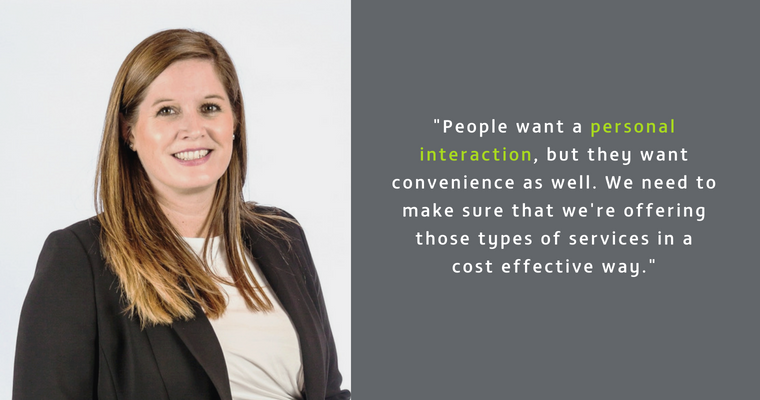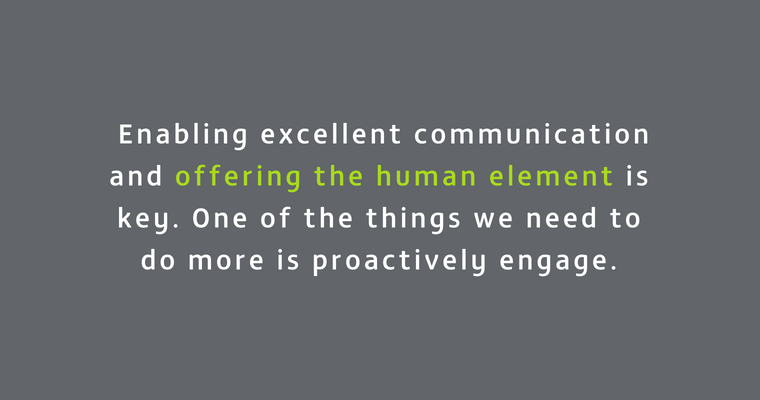How Pelican and water2business are using digital technology to drive simplicity for utilities customers
Written by Robyn Jones
Here, Charley tells us why digital technology should be used to enable simplicity, speed and choice…

Where do you see the biggest opportunities for utilities companies to strengthen their offerings?
It’s about keeping it simple. Most customers want things presented to them in a simple way—they want ease of access when they need us.
However more importantly, it's about whether the customer trusts us to get it right first time. We can't make errors, our processes must be robust, and we have to automate where possible to remove risk. I think all of those things are really important.
In both the household and the non-household water markets we’re seeing more customers preferring to manage their account online, whether that’s accessing their account information through a portal, through live chat, or visiting the website. Emails and live chat are on the rise year-on-year, while letters and telephone services are declining.
People want a personal interaction, but they want convenience as well. If they can avoid sitting in a queue, or if they can multitask while they interact with us, they're often more likely to take that option. We need to make sure that we're offering those types of services.
We’re looking at how we do that in a cost effective way, so it's not the customer that has to pay for it.
How are digital channels providing a more cost-effective way to communicate with customers?
Many people have this perception that communicating via email or live chat is cheaper for us than manning a contact centre, but this isn’t always the case.
When you have a conversation with somebody over the telephone you're able to ask questions very quickly, understand what they need, and provide them with the service that they're looking for. But once somebody sends you an email it can involve a lot of back and forth, which can take longer than a telephone call.

Live chat poses the same problem. A lot of customers actually use live chat when they're at work, so there may be long pauses before they respond to questions. Instead of a four minute phone call, you could be talking about a 20 minute chat, which isn't so cost effective.
We’re currently working with Mando to explore the use of Artificial Intelligence (AI) powered chatbots to deal with standard queries.
Is that purely driven by cost?
No. One of the big challenges in the water industry is the regulation around how quickly you must respond to the customer. If it's telephone or electronic queries, we have to respond within five days. If it's written correspondence, we have 10 days to respond.
While we are well within those timelines, one of the things that we're really excited to look at is using AI as a filter system to support customers with standard queries, and provide answers straight away. This would give these customers a better service, while also enabling us to better serve customers who still need that personal human touch - or who have more complex questions or needs.
We are always looking to save costs where we can, but the main driver of this is to explore whether we can do more with less, and serve customers more quickly.
At the moment, the main way we could do that is to bring in more staff, which are our most expensive resource. AI might offer a solution.
What do you see as the biggest threats and challenges in the industry?
One of the biggest concerns is the possibility of nationalisation, something which has seen plenty of press coverage. Right now, we see regular investment in service and in the infrastructure of the water industry which is a positive thing for customers.
Household deregulation is another topic which keeps resurfacing. We've seen that the IT systems and billing systems used by most household operators in the retail environment aren’t designed for multi-wholesalers. All of a sudden they go from one or two wholesalers to 19 wholesalers, plus all the complexities of tariffs. This rapid change creates a lot of pain points, and it's the customer who suffers.
While it’s slightly less complex for households because the tariffs are simpler, you would have 10 times the volume of customers than in the commercial world, and that volume would be far more complex to manage through transition.
Are there any examples of companies offering convenience and simplicity that the utilities sector could learn from in terms of customer experience?
In the financial sector, First Direct and HSBC offer a really interesting comparison. Their contact centres operate out of the same building, but the customer outcomes and the company cultures are worlds apart. You can see it in their customer satisfaction results. Of course, that's not to say that HSBC has poor satisfaction, it's just that First Direct is so good.
First Direct’s banking app is probably the most basic banking app on the market, but it works because they focus on simplicity and cost-effectiveness. They deliver what they know the customer needs, and they don’t put any bells and whistles on it, because the bells and whistles cost money. They're offering the best priced product they can, and it works really well for them.
Another example is John Lewis’ ‘no-quibble’ guarantee. I am often amazed by the lack of empathy some utilities demonstrate to customers, and the apparent inability to say sorry. With John Lewis though, if someone isn't happy with a product they take it back - and with confidence. The company’s culture empowers their staff and trusts that they understand the customer.
It’s about demonstrating that human side, and I think utilities could learn a lot from that.
How can water companies use digital to increase engagement with customers who they often only interact with twice a year?
Ten years from now we'll be in a very different place, because everyone will most likely do everything electronically.
At the moment it’s about ‘what do we tell them that's different to what we've always told them?’ It’s about putting the customer in control and empowering them to manage their own account. I think in the water sector in particular, enhancing the information you provide to a customer, about how they’re using their water and comparing their usage to others, is a really good way to engage.
Enabling excellent communication and offering the human element is key. One of the things we need to do more is proactively engage.
With an electricity or gas contract, providers have the ability to terminate their service if you don't pay, so often ask for lots of personal information. The water industry hasn’t historically collected that level of detail from customers because in the household market you're not able to disconnect customers if they don't pay. That is changing, so most water companies will ask for additional information these days.
Collecting mobile numbers and email addresses from customers is imperative, and encouraging customers to supply us with that information allows us to proactively communicate with them when something's going on in their area.

There’s also an opportunity to share customer mobile numbers and email addresses among utilities in order to support more proactive service levels. It might sound a bit pie in the sky, but it could be a good innovation.
Do you see any opportunities with new and emerging technologies?
If you take the cloud, we invoked disaster recovery and business continuity plans last month because a digger cut through the cables to our building. Not all of our systems are cloud-based, and while we were able to access our cloud-based services from elsewhere, we had an issue with anything that wasn't in the cloud because it was physically in the building. We're currently looking at how we can move to a more agile environment using cloud technology.
Data and analytics is also a massively under-utilised area. Pelican has just under one and a half million household customers, and the potential for data-driven decision making is huge in driving those right outcomes. This depends on having the right data in the first place, and interpreting it correctly. I think GDPR will support the need for everyone to have accurate data.
There are numerous uses for behavioural insights, but a key one for us would be identifying our socially vulnerable customers, and to better communicate with them.
How much do you see the Internet of Things (IoT) and the connected home impacting on the water industry?
In a non-household market, IoT is where we can use data loggers to monitor consumption activity for customers. We can also add value in terms of water efficiency, helping them to work out when they're using the most water so they can manage their usage and find ways to reduce bills.
Providers might only get in touch with customers twice a year, when it’s time to pay a bill. This doesn’t always have positive connotations, so offering positive interactions outside of this and offering additional value will improve and deepen the customer relationship.
It also encourages loyalty and trust. If customers know that the data informing their bills is being taken accurately and on a regular basis, they’re going to believe that they are being offered the best service.
IoT also helps to test potential leaks, as it will recognise issues or problems with the supply. Again, this is going to help protect the customer as providers can update and inform them about any problems with their supply.
IoT wouldn't be cost effective for the household market right now, but as data and technology improves, there will definitely be opportunities in the future.
What do you think other sectors can learn from the way water companies are preparing for PR19?
The biggest area is probably the SIM (Service Incentive Mechanism) score. If you look at an industry like financial services for example, all the banks ask their customers slightly different questions to find out if customers would recommend them.
This feeds into their NPS (Net Promoter Score). But they target customers using a variety of approaches and multiple communication channels. It’s inconsistent.
One of the things I think SIM does really well is compare apples with apples, as well as being carried out independently. I think that’s definitely something many other industries could learn from.
Under PR19, Ofwat is changing SIM to WaterworCX, which is designed to stretch companies to improve their customer experience further. A part of this is encouraging companies to speak to all of their customers—not just those who have a reason to contact them, but the so-called ‘silent customers’. This is an exciting opportunity for us to engage more deeply with a wider audience.
What else is going on
-
March 2024
Ghost Spam in GA4 – How to Spot and Deal With It
How to spot and deal with ghost spam in Google Analytics 4 (GA4) to safeguard your data insights. Implement proactive measures to maintain data accuracy.
-
November 2023
Mando to bridge skills gap at BIMA Digital Day
The BIMA Digital Day on November 8th is an attempt to bridge this skills gap, as eight of Mando's experts will spend time with around 240 Year 10 students from The Studio School at their Liverpool campus.



